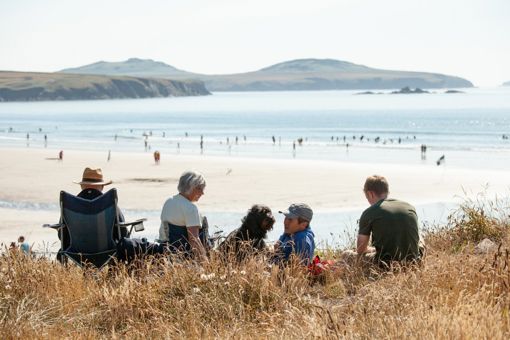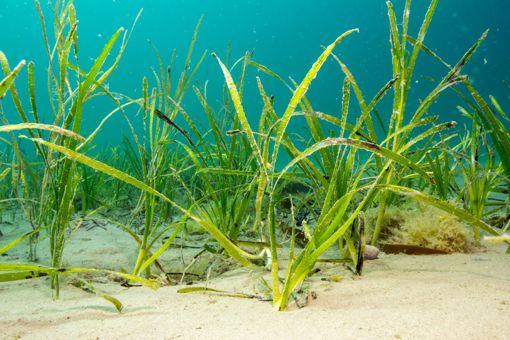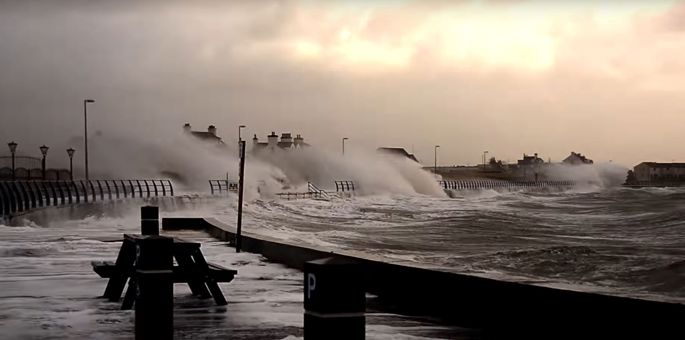Making the most of marine planning

image by Charles Lindenbaum
Why this theme?
This theme looks at planning in the marine environment. Marine planning should help us decide what happens where to ensure that our seas are healthy, resilient and provide us with what we need - energy, food, enjoyment - now and in the future.
On land we are used to planting woodland, hedgerows or even digging ditches to help create new habitats and directly achieve nature recovery. It is much more difficult to do this at sea. Instead, we opt to look at better managing or reducing the pressures on the marine environment (such as pollution, marine developments or fishing activity). This allows habitats and species to recover naturally. Marine planning is an important tool because it informs decisions about where activities should, and shouldn’t, take place in our seas.
Historically, decisions about activities in our seas were made on a case-by-case basis. By the end of 2019 all of this changed and the Welsh National Marine Plan was adopted by the Welsh Government. For the first time, decisions relating to our marine environment have to consider the bigger picture. This includes how activities in the sea impact on the well-being of coastal communities, marine wildlife, and on our economy.
Our seas are increasingly busy supporting a range of different activities and uses. For example:
- Marine aggregate for building - 80% of sand used for construction in south Wales comes from our seas
- Aquaculture - farming shellfish, fish, seaweed and algae (Wales provides 37% of the total UK mussel production)
- Fisheries - the commercial fishing industry in Wales employs over 800 people
- Defence - this includes operational vessels, HM naval bases and everything associated with them including navigation, acoustic ranges and exercises in the sea
- Renewable energy - Wales has a range of tide, wave and wind resource at sea that can provide clean energy to help combat climate change
- Subsea telecommunications cabling - worth £260 million to Wales which makes our seabed a very important place now and in the future
- Tourism - in 2013 coastal tourism in Wales was estimated to be worth £602 million and totalled 3.6 million trips
- Welsh ports - handled 54 million tonnes of cargo in 2014, equivalent to 18 tonnes per person in Wales
Marine planning is about finding the space for these activities to thrive, at the same time as ensuring our seas are healthy and resilient.
Information about the marine environment is quite patchy and often held in different places and in different formats. Understanding how different uses of the sea interact with other interests is crucial to enable us to make decisions about the most appropriate places for different activities. Collecting information about the marine environment is costly. It’s therefore important to be able to identify and target evidence collection where we need it most.
As our understanding grows, the marine planning process could start to be more prescriptive. This would mean identifying what activities should happen where, how much activity is appropriate, and even where some activities could be prevented.
Wales has recognised a climate and nature emergency. It is really important that we make the most of the opportunities around Wales to harvest clean, renewable energy from the sea in our efforts to tackle climate change. Decisions about sustainable offshore renewable energy developments, such as windfarms, will be aligned to the new marine planning process. There is an urgent need to ensure that any renewable developments constructed in our seas work in harmony with the natural environment around them.
 image by John Briggs
image by John Briggs
What would success look like?
During discussions with our partners we have collectively identified specific goals that we all wish to work towards:
To use the best available evidence to make decisions in planning
We have been looking at what information is out there in terms of evidence or guidance on how we manage our seas. We would like to identify what additional information is needed so we can start to bridge the gaps.
Gathering and understanding the evidence is a big task. It may not be possible to understand everything we need to plan for in the structured way we do on land. We are already working with partners to explore this, focusing on three sectors:
- Marine renewables – power harnessed from waves and tide
- Marine aggregates – sand and gravel harvesting from the sea
- Aquaculture – the breeding, rearing, and harvesting of fish, shellfish, algae, and other organisms in the marine environment
 Image provided by Tarmac Marine Dredging Limited
Image provided by Tarmac Marine Dredging Limited
To ensure the marine planning process enables nature recovery
The current marine plan includes environmental policies that protect and enhance the marine environment. We have identified the need for more clarity around terms used such as ‘resilience’, ‘enhancement’ and ‘compensation’. We need more information about where we should target efforts to increase resilience in Welsh waters. We also need more information about how enhancements can be embedded into developments. These should be considered to ensure that nature recovery delivers the most benefit to the people of Wales.
 Image by Marine Monitoring Team at Natural Resources Wales
Image by Marine Monitoring Team at Natural Resources Wales
To support sustainable renewable energy development whilst ensuring that the marine environment is protected and enhanced
We are facing a climate emergency. Welsh seas offer a range of renewable energy sources from wave, tide and wind. However, these activities have the potential to impact on marine ecosystems and the wildlife they support. We need to work together with developers, and other partners, to understand and address these challenges if we hope to achieve the potential of marine energy in Wales.
 Image by Kate Smith
Image by Kate Smith
To achieve effective integration of marine and terrestrial planning
Given that marine planning is a new concept, it will take time for users of the plan to become familiar with it and use it effectively. Collectively, we would like to explore how the marine planning process can aid better decision-making especially in the areas where boundaries overlap, and adjoining authorities have dual responsibility to make decisions. For example, in the Dee and the Severn Estuary, separate marine plans exist in England and Wales, making decision-making more complex.
We feel that if guidance and evidence is provided at the right scale (e.g. the whole of an estuary) then authorities could make more ‘joined-up’ decisions.
Who have we worked with to date?
We have worked with the Welsh Government Marine Planning Stakeholder Reference Group to explore and develop this theme. The group includes a range of partners with different backgrounds and expertise in the marine area and include:
- Marine industry bodies such as Marine Energy Wales and the Welsh Fishermen’s Association
- User groups such as the Royal Yachting Association
- Universities
- Non-governmental bodies such as the Royal Society for the Protection of Birds and the Marine Conservation Society
- Public bodies such as the Welsh Local Government Association
This group has been working together for some time to think about the development of marine planning. This meant that we were able to work quickly together to identify the key opportunities in marine planning and the actions we, individually or collectively, can take to address them.
We are conscious that we have not yet engaged at a more local level about the opportunities that marine planning brings. Some people may have little direct knowledge of the marine environment, yet still have an interest in the benefits it provides to them personally. Moving forwards, a priority will be to engage with a wider range of people to understand their views.
What are the next steps?
In the development of this theme we collectively identified the actions set out below with our partners from the Marine Planning Stakeholder Reference Group (MPSRG). Both the Welsh Government and the MPSRG have confirmed that they wish to continue to work with us to lead on, or contribute, to these actions.
To use the best available evidence to make decisions in planning:
- Work collaboratively to understand the key constraints and opportunities for some key sectors (marine renewables; aggregates; aquaculture)
- Learn together from this work to understand exactly what the marine planning process can do to help get the right activity in the right place
- Explore the potential to develop tools such as Marine Planning Notices
To ensure the marine planning process enables nature recovery:
- Co-create guidance to support implementation of the environmental enhancement policy in the marine plan
- Start to identify what and where the key opportunities are for delivering nature recovery to improve ecosystem resilience in the marine area
- Improve understanding of the wider benefits of marine ecosystems to the people of Wales
- Explore what planning tools could be used to support nature recovery (for example use of voluntary approaches, financial incentives, statutory mechanisms)
To support sustainable renewable energy development whilst ensuring that the marine environment is protected and enhanced:
- Develop an offshore renewable energy programme to ensure a co-ordinated and effective approach to Natural Resources Wales’ work on sustainable offshore renewables
- Work collaboratively with Marine Energy Wales, the Welsh Government and other partners to develop an action plan to support consenting of sustainable offshore renewable energy projects
- Work with partners to explore the feasibility of tools to streamline the assessment of environmental effects of renewable developments
- Maintain and improve the evidence base for decisions by maximising the learning from deployments in Wales and by learning from experience elsewhere
- Advise on the development of The Crown Estates’ leasing plans and Strategic Enabling Actions Programme to facilitate planning and decision-making of sustainable offshore wind development
To achieve effective integration of marine and terrestrial planning:
- Identify relevant authorities and promote and raise awareness of the Welsh National Marine Plan, including through the Marine Planning Decision Makers Group
- Maintain and improve access to relevant data supporting planning and decision-making
- Explore the priority additional evidence and guidance needs to support sustainable and consistent decision-making and fill gaps
- Explore processes and tools that can help to support joined-up decision-making at the coast
- Monitoring of use of the Welsh National Marine Plan policies in decision-making
How does what we’ve proposed deliver Sustainable Management of Natural Resources (SMNR)?
Developing a Marine Plan for Welsh waters has already brought together a wide range of stakeholders. The discussion and actions set out in this theme reflect the culmination of collaborative engagement over several years to inform the development of a marine plan that is fit for purpose.
The actions set out in this Marine Area Statement reflect our thinking that if we build the evidence base, we will improve our understanding of the interactions of different activities in our seas. This should help guide marine activities into the best locations. As our understanding improves, plan policies could be adapted and amended by the Welsh Government to ensure we are making the best decisions about using our seas.
By focusing on supporting the marine renewable sector, we are taking preventative action to reduce carbon emissions and combat climate change.
We are exploring how the marine planning process can support building the resilience of our marine ecosystems. A common understanding of what this means in practice is a critical step and we also need to understand what tools and mechanisms we could use to do this.
We appreciate the actions set out here are short-term and will be focused mainly over the next 12-24 months. However, they will contribute to a long-term, shared vision for our seas.
We will continue to work with our existing partners to deliver this work. We also plan to engage with local communities to help us to understand how people value the seas around Wales and also how they want to participate in managing this important resource. This could bring new perspectives and evidence to improve decision-making under the Marine Plan.
 Image by Bill Sanderson
Image by Bill Sanderson
How can people get involved?
This theme is only the beginning of the journey as we work with people in Wales to improve the management of our coasts and seas. If you would like to be part of this process, please get in touch with us using the following form. You can also email us direct at: marine.as@cyfoethnaturiolcymru.gov.uk




